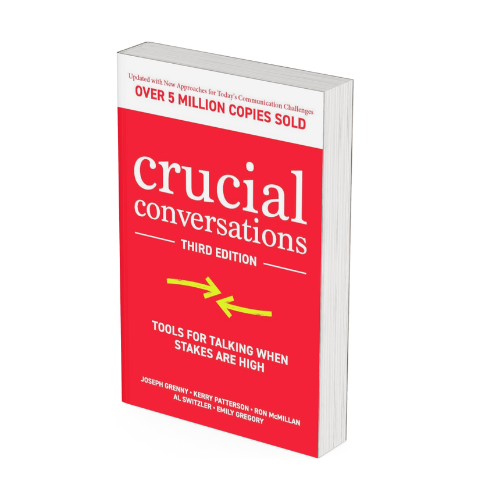Crucial Conversations
by Joseph Grenny, Kerry Patterson, Ron McMillan & Al Switzler
The Author
Social scientist and best-selling author Joseph Grenny excels in leadership, persuasion, and effective communication. Along with three other communication, organisational development, and corporate strategy experts—Kerry Patterson, Ron McMillan, and Al Switzler—he co-wrote Crucial Conversations. Together, they compiled a manual for handling meaningful conversations, whether at work or at home. By sharing their knowledge and insights, they aim to equip readers with the skills to navigate difficult conversations, especially when emotions run high.
Summary of Crucial Conversations
Crucial Conversations is about handling challenging and high-stakes talks. This book offers practical skills for staying calm, communicating effectively, and achieving remarkable outcomes. These techniques are invaluable whether managing a family argument, addressing a sensitive subject with a colleague, or dealing with situations where emotions are boiling and outcomes are critical.
The book provides a foundation for navigating these tough talks by dissecting their anatomy. One of its main points is the importance of making everyone feel safe enough to express their true thoughts without fear of judgment. This involves recognising when a discussion has reached a “crucial” point—defined by strong emotions, competing viewpoints, and high stakes—and using strategies like attentive listening, polite questioning, and considerate speech to foster open dialogue.
Learning to control your own emotions is another key takeaway. Recognising and managing emotional reactions is crucial, as emotions can cloud judgment and communication. The authors suggest reframing negative self-stories about the situation or other person to approach conversations more objectively and constructively.
Furthermore, the book emphasises the value of shared objectives. By focusing on common goals, conflicts can be resolved more positively, as both sides feel heard and work towards mutual understanding.
My Thoughts on Crucial Conversations
I found Crucial Conversations to be a challenging read. The complexity and depth of the subject matter made it harder to grasp than I initially expected. I had anticipated a simpler guide, but the book delves into communication’s emotional and psychological dimensions, which required more effort to process and apply.
I struggled particularly with keeping my emotions in check during conversations with high stakes. While the book outlines methods to restructure internal narratives and manage negative emotions, putting these concepts into practice was difficult for me. At times, I reverted to old habits, such as avoiding difficult topics or allowing my emotions to take control.
However, I began seeing the benefits once I applied some strategies. One of the most transformative lessons was creating a safe environment for open dialogue. My protective attitude often led to defensive responses from others, but by prioritising respect and safety in conversations, I noticed a significant shift. The tone of my interactions improved when I stopped trying to “win” and focused on understanding the other person’s perspective.
Another impactful lesson was the emphasis on shared objectives. In the heat of arguments, it’s easy to become fixated on proving oneself right. Instead, as the book suggests, I began to focus on the desired outcome for both parties. This mental shift fostered a cooperative rather than confrontational approach to challenging conversations.
Despite my initial struggles, I now see Crucial Conversations as an essential resource for anyone in leadership, therapy, or coaching. While I have yet to master the principles fully, I believe they will become second nature over time, enabling me to approach difficult discussions with balance and clarity.
Lessons from Crucial Conversations for Clients and Colleagues
For leaders, therapists, and coaches, the following lessons are particularly valuable:
- Create Safety Before Starting Difficult Conversations: Ensure all parties feel respected and secure before diving into challenging topics. A safe environment reduces defensiveness and encourages candour.
- Manage Your Emotions: Recognise when your feelings are interfering with rational decision-making. Ground yourself in the facts, set emotions aside, and approach discussions logically.
- Stay Curious, Not Defensive. Ask open-ended questions to understand the other person’s perspective. Curiosity paves the way for solutions, while defensiveness creates barriers.
- Focus on Shared Goals: Avoid getting bogged down in debates about who is right. Identify mutual objectives to guide the conversation toward resolution.
- Don’t Avoid Difficult Discussions: Delaying uncomfortable conversations often worsens the problem. Address challenges head-on using the strategies outlined in the book.
- Monitor Your Triggers: Pay attention to emotional reactions during high-stakes conversations. Controlling these triggers can help you steer the dialogue more effectively.
- Use “Contrasting” to Clarify Intentions: This strategy involves stating what you don’t mean before clarifying what you do mean, reducing the risk of misunderstandings and defensiveness.
In Summary
Crucial Conversations is an all-encompassing guide to navigating conversations that can significantly impact your career or personal life. While I found it challenging to implement all the concepts immediately, the book offers invaluable tools for staying calm, communicating effectively, and finding common ground during contentious discussions. In particular, leaders, coaches, and therapists will benefit greatly from its practical advice on fostering meaningful and productive conversations.
Crucial Conversations
by Joseph Grenny, Kerry Patterson, Ron McMillan & Al Switzler
The Author
Social scientist and best-selling author Joseph Grenny excels in leadership, persuasion, and effective communication. Along with three other communication, organisational development, and corporate strategy experts—Kerry Patterson, Ron McMillan, and Al Switzler—he co-wrote Crucial Conversations. Together, they compiled a manual for handling meaningful conversations, whether at work or at home. By sharing their knowledge and insights, they aim to equip readers with the skills to navigate difficult conversations, especially when emotions run high.
Summary of Crucial Conversations
Crucial Conversations is about handling challenging and high-stakes talks. This book offers practical skills for staying calm, communicating effectively, and achieving remarkable outcomes. These techniques are invaluable whether managing a family argument, addressing a sensitive subject with a colleague, or dealing with situations where emotions are boiling and outcomes are critical.
The book provides a foundation for navigating these tough talks by dissecting their anatomy. One of its main points is the importance of making everyone feel safe enough to express their true thoughts without fear of judgment. This involves recognising when a discussion has reached a “crucial” point—defined by strong emotions, competing viewpoints, and high stakes—and using strategies like attentive listening, polite questioning, and considerate speech to foster open dialogue.
Learning to control your own emotions is another key takeaway. Recognising and managing emotional reactions is crucial, as emotions can cloud judgment and communication. The authors suggest reframing negative self-stories about the situation or other person to approach conversations more objectively and constructively.
Furthermore, the book emphasises the value of shared objectives. By focusing on common goals, conflicts can be resolved more positively, as both sides feel heard and work towards mutual understanding.
My Thoughts on Crucial Conversations
I found Crucial Conversations to be a challenging read. The complexity and depth of the subject matter made it harder to grasp than I initially expected. I had anticipated a simpler guide, but the book delves into communication’s emotional and psychological dimensions, which required more effort to process and apply.
I struggled particularly with keeping my emotions in check during conversations with high stakes. While the book outlines methods to restructure internal narratives and manage negative emotions, putting these concepts into practice was difficult for me. At times, I reverted to old habits, such as avoiding difficult topics or allowing my emotions to take control.
However, I began seeing the benefits once I applied some strategies. One of the most transformative lessons was creating a safe environment for open dialogue. My protective attitude often led to defensive responses from others, but by prioritising respect and safety in conversations, I noticed a significant shift. The tone of my interactions improved when I stopped trying to “win” and focused on understanding the other person’s perspective.
Another impactful lesson was the emphasis on shared objectives. In the heat of arguments, it’s easy to become fixated on proving oneself right. Instead, as the book suggests, I began to focus on the desired outcome for both parties. This mental shift fostered a cooperative rather than confrontational approach to challenging conversations.
Despite my initial struggles, I now see Crucial Conversations as an essential resource for anyone in leadership, therapy, or coaching. While I have yet to master the principles fully, I believe they will become second nature over time, enabling me to approach difficult discussions with balance and clarity.
Lessons from Crucial Conversations for Clients and Colleagues
For leaders, therapists, and coaches, the following lessons are particularly valuable:
- Create Safety Before Starting Difficult Conversations: Ensure all parties feel respected and secure before diving into challenging topics. A safe environment reduces defensiveness and encourages candour.
- Manage Your Emotions: Recognise when your feelings are interfering with rational decision-making. Ground yourself in the facts, set emotions aside, and approach discussions logically.
- Stay Curious, Not Defensive. Ask open-ended questions to understand the other person’s perspective. Curiosity paves the way for solutions, while defensiveness creates barriers.
- Focus on Shared Goals: Avoid getting bogged down in debates about who is right. Identify mutual objectives to guide the conversation toward resolution.
- Don’t Avoid Difficult Discussions: Delaying uncomfortable conversations often worsens the problem. Address challenges head-on using the strategies outlined in the book.
- Monitor Your Triggers: Pay attention to emotional reactions during high-stakes conversations. Controlling these triggers can help you steer the dialogue more effectively.
- Use “Contrasting” to Clarify Intentions: This strategy involves stating what you don’t mean before clarifying what you do mean, reducing the risk of misunderstandings and defensiveness.
In Summary
Crucial Conversations is an all-encompassing guide to navigating conversations that can significantly impact your career or personal life. While I found it challenging to implement all the concepts immediately, the book offers invaluable tools for staying calm, communicating effectively, and finding common ground during contentious discussions. In particular, leaders, coaches, and therapists will benefit greatly from its practical advice on fostering meaningful and productive conversations.
“Resilience is not about bouncing back. It’s about bouncing forward into a new reality.”
Recent Thoughts
When Love Turns to Hate: Why Justice Must Stay in the Courtroom and Not Online
As a therapist working closely with couples and individuals in high-conflict relationships, I have seen the full emotional arc of love, from intimacy
Stress at the Top
Why Leadership in Malta is More Isolated Than You Think We often picture business leaders as confident, driven, and in control. They make




